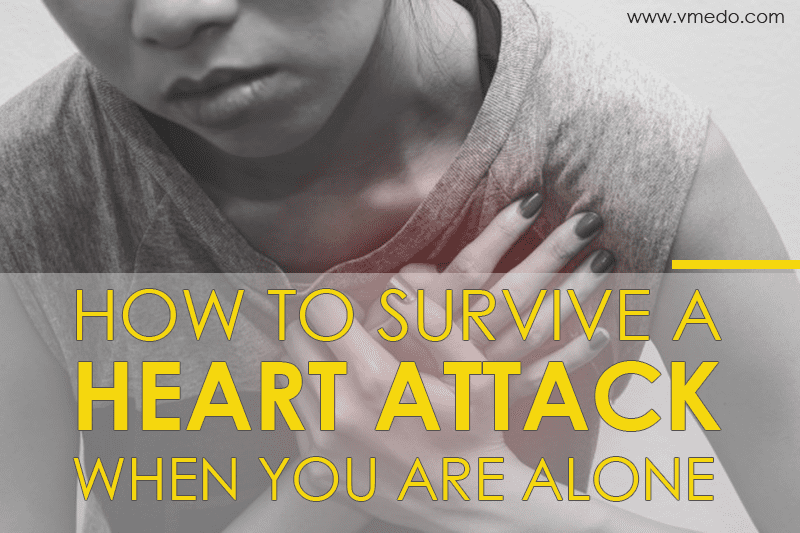The heart attack is a fatal occurrence, that can happen at any time. It is the number one killer around the world. In India, for every 33 seconds, it kills one person. So receiving treatment as soon as possible can reduce the risk of further damage & mortality.
Statistics have shown 70% of heart attack deaths occur either in the first hour, before the victim reaches the hospital or when the individual was alone.
Here is the information that helps you to recognize a heart attack, even when you are alone and what you can do to stay alive.
Many of the people do not know, they can actually help themselves at the time of heart attack & to do so, the most important thing is to know your symptoms of heart attack, act quickly, not to panic and not to lose the consciousness in order to maximize your chances of survival.
1.Recognize the Signs of Heart Attack & Act quickly:
It’s important to recognize Heart attack symptoms which may differ from person to person. 90% heart attack victims experience few common symptoms that include:
- Severe chest pain (like squeezing) at the central part of the chest, lasting usually for at least 20 min. The chest pain may also spread to the upper part of the body, left upper arm, shoulders, neck or jaw.
- Profuse sweating and a feeling of impending doom.
- Additional symptoms include difficulty in breathing, extreme weakness, rapid & irregular heartbeats.
Many a times, females & people suffering from diabetes may experience different symptoms of heart attack that include shortness of breath, mild chest pain that can increase in severity over time, shoulder pain, nausea, impending doom, vomiting, and pain in the epigastric region (an upper central portion of the abdomen). Many times these signs are misinterpreted as indigestion or the flu.
Never downplay or ignore symptoms that may point to a heart attack, & seek immediate medical attention.
2. Contact Medical Emergency Services:
Once you recognize your Heart attack signs, the first thing that you should do is calling emergency medical services(Ambulance Services), to receive immediate medical attention within the first hour of the attack, that can mean the difference between life and death.
If you feel any of the above symptoms, call 9343180000 / 08067335555 or 108 (your country’s equivalent emergency helpline number) to get help immediately.
If you are alone, request for neighbor’s help. And if you’re on the road, stop your vehicle & request for someone’s help, or call 08067335555 or 108 to get emergency help.
Do not attempt to Drive: Don’t attempt to drive yourself to the hospital which may worsen the condition by losing your consciousness while driving; causing an accident that could harm yourself and others.
3. Medications:
While waiting for medical services, stay calm, avoid anxiety, lie down and rest and try to avoid activities that can further increase your heart rate.
Many of the studies have shown that chewing Aspirin is the best blood-thinning medication that helps in heart attack survival & prevents the blood clot from getting thicker, & enhances in breaking the blood clot. Because many of the time heart attacks are caused by a blood clot of one of the blood vessels which are responsible for supplying blood for the heart, results in loss of oxygen, causing damage to the heart muscle, which progressively dies.
Imp: Some people are allergic to Aspirin & results in worsening the conditions, are strictly do not follow this treatment. However, ask your physician before in taking aspirin in advance.
Many times, physician’s advice Nitro-glycerin, a medication that temporarily widens the blood vessels to improve the blood flow to heart & provides better comfort. So, if you have prescribed nitro-glycerin, you can use it for survival during a heart attack.
Avoid food and drink when you experience a heart attack. Having anything other than aspirin & prescribed medications can make it more complicated.
4. Cough Repeatedly:
After taking aspirin & any other prescribed medication, the victim can help themselves by coughing repeatedly and very vigorously. A deep breath should be taken before each a cough for every 2 seconds and cough constantly.
Coughing is recommended by most of the physicians, which acts as a natural compression and helps in improving the heartbeat. A breath and a cough must be repeated until help arrives. Deep breaths help in providing oxygen into the lungs and coughing movements squeeze the heart & the body and help in maintaining blood circulation.
It is one of the perfect ways to avoid any further damage, at least until the doctor comes.
If you feel relaxed after coughing, lie down. Lie on your back and lift your leg upward that opens up the diaphragm, making it easier for you to breathe and supply oxygen to your blood.
These tips had proven to be effective numerous times.
“Prevention is better than Cure”. Be emergency prepared with VMEDO
P.S: Share this information with at least 10 people, which can save at least one life.
If you are looking for first aid, CPR, AED, and Basic Life Support training program Click here and Register.



